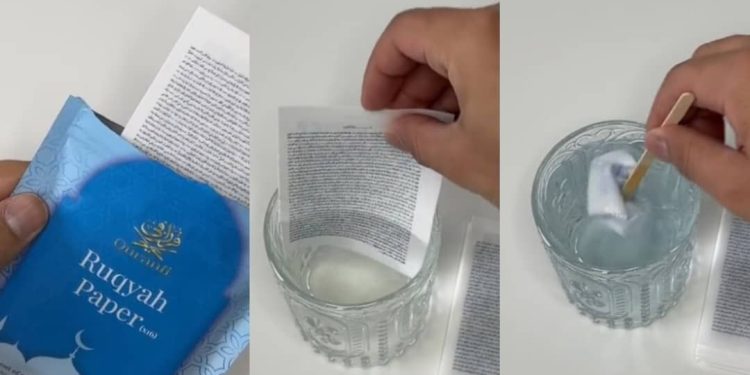Jakarta, Indonesia Sentinel — A unique product blending faith and practicality is making waves in Indonesia. The “Ruqyah Paper,” a dissolvable paper inscribed with a Quranic verse, has gone viral on social media. Marketed as a tool for ruqyah—a spiritual practice involving Quranic recitation to heal physical and spiritual ailments—the product has drawn praise for innovation but also sparked significant controversy.
Ruqyah is a well-established Islamic tradition used to treat illnesses believed to stem from supernatural causes like possession, black magic, or the “evil eye.” Traditionally, this involves reciting Quranic verses or prayers taught by Prophet Muhammad. The Ayat Kursi, one of the most revered verses in the Quran, is a common choice in these rituals.
The viral product, as shown in a video shared by X user @ikramarki, comes in a small green sachet labeled “Ayat Kursi Ruqyah Paper.” Upon opening, the sachet contains a small edible paper printed with the verse in black ink. To use, consumers dissolve the paper in a glass of water, stir it like tea, and drink the water as a means of self-healing.
Reactions on Social Media
Social media users in Indonesia have been quick to respond, with opinions ranging from supportive to skeptical. Some praised the innovation for making ruqyah more accessible, particularly for those unable to consult a religious leader or practitioner.
One user joked about the practicality of the product, saying:
“My sibling needs this. It’s so much easier than calming them when they’re crying hysterically like they’re possessed.”
Others took a more humorous approach, with one commenter noting:
“I need this for my friend who’s acting like a demon lately.”
Concerns Over Religious Integrity
However, not all responses were positive. Many questioned whether the practice aligns with Islamic teachings. Critics argue that placing faith in a product rather than the act of recitation could lead to superstition or shirk (associating partners with God), which is strictly forbidden in Islam.
One netizen voiced concern over misplaced faith:
“Doesn’t this count as shirk? Believing in the paper instead of practicing the meaning of the verse?”
Others worried the product might mislead users into believing it has intrinsic power, rather than understanding the spiritual essence of ruqyah.
The debate extends beyond theology, touching on ethics and commercialization. While proponents see it as a creative adaptation of tradition, detractors caution against reducing a sacred practice to a consumer product. Questions also arise about the safety of consuming printed paper, even if it is labeled edible.
Read Also:
Insects on the Menu: Indonesia’s Free Nutritious Meal Program Adds Edible Bugs
Cultural Context and Broader Implications
Indonesia, home to the world’s largest Muslim population, is a hub of Islamic practices often adapted to modern lifestyles. From digital prayer apps to Islamic financial services, the blending of tradition and technology is commonplace. Yet, the “Ruqyah Paper” reveals the tension between innovation and preserving religious authenticity.
As the product continues to gain traction, it raises important questions about how faith-based practices are evolving in the digital age. Is this a harmless adaptation for modern convenience, or does it risk diluting the spiritual essence of a revered tradition?
For now, the viral trend serves as a reminder of the delicate balance between innovation and maintaining the sanctity of religious practices.
(Becky)

























